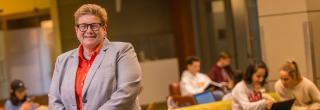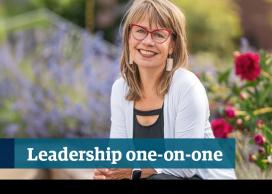Susan E. Parker joined UBC in September 2017, as University Librarian. In her role, she is responsible for providing strategic oversight of the UBC Library system. She has held a number of leadership roles at Tufts and Harvard Law School (where she knew the young Barack Obama), before moving to California State University, Northridge, as the Associate Dean of the Oviatt Library and Associate Professor. Most recently, she served as the Deputy University Librarian and Chief Financial Officer at the University of California, Los Angeles.
Q1. What quality do you most admire in a leader?
SP: Above all, I admire leaders who have the courage to tell the truth, whether it’s good or bad. They face challenges and are honest about them. They prepare stakeholders with the facts, so they can build trust and the ability to move forward together.
I also admire leaders who have articulated values that are clear. They can assemble collaborators who can understand their values and help echo them out.
Finally, I admire leaders with the wisdom and curiosity to learn what people in the organization are thinking about and what they need, and are able to wrap that knowledge into what they do.
Q2. What makes you laugh?
SP: Very clever verbal humour makes me laugh, like Monty Python. Or really dry wit like Bob Newhart. I also love Lily Tomlin, Tina Fey and Carol Burnett, because they offer really sharp observations with empathy. They are not cruel and they don’t make fun of people. They bring you in on the joke, which I really like. Slapstick and characters like Bugs Bunny really make me laugh too!
Q3. Who inspires you, and why?
SP: I find Michelle Obama to be an incredible inspiration, especially for young women. Her husband too, for the charismatic optimism he has. It’s hard to resist. I had the opportunity to meet Barack Obama when I worked at Harvard Law School. He was a student leader at the time, which was no surprise, and also the Head of the Harvard Law Review. He was exactly what you see on TV… someone that everyone gravitates towards. He had the voice of reason, and also the voice of someone who gets things done.
Thinking more deeply, I’ve found Landrum Bolling to be incredibly inspiring. He was a Quaker educator and lifelong advocate for peace and social justice, and also the president of Earlham College in Richmond, when I was a student there.
Landrum spent his whole life working on different peace initiatives. He was the secret back channel to Yasser Arafat from the White House during the peace accords under Jimmy Carter. He was the first person I met in real life who demonstrated what having strong values and the commitment to putting them into action can do. In his case, it was for the cause of peace. He was an amazing character.
Q4. What’s the most important lesson you’ve learned during your career?
SP: To show up and be yourself. To participate with meaning and authenticity. It’s as simple as that.
Q5. How do you like to recharge?
SP: Reading, unsurprisingly! And walking and kayaking. I like to travel too. But I also love to be at home. Home is a really important place of recharge for me.
Q6. Who are your favourite writers?
SP: Mark Twain is my favorite writer. He has a great way of taking down fakes and phonies, but is also brilliant at painting a picture of a scene, complete with sounds and colors. My favourite of his works is lesser known, called Life on the Mississippi. In it, he talks about his days learning to be a steamboat pilot on the Mississippi River before the American Civil War. I’ve never found anyone I like to read as much as Mark Twain.
I also enjoy Lisa See, a Chinese American author, who writes historical novels about old China. She likes to explore her own history through storytelling.
I do read a lot — probably too much — about management, organizations and libraries… and when I’m not doing that, I read biographies and history. I’m enjoying reading about the history of British Columbia right now.
Q7. What is the best advice you were ever given?
SP: Take care of yourself, but never be afraid to ask for help.
Q8. What do you value in your colleagues?
SP: I value colleagues who respect each other, and who also bring a real desire to do the job and do it well. I really like people who are here to carry their own load, but also to help others when they need it. I like it if the people around me are positive. It helps me to stay positive. And don’t take each other too seriously. A little bit of humor goes a long way!
Q9. What would you like to be remembered for?
SP: For leaving the UBC Library on a good footing. The library needs to be able to grow, to fit the needs of the community. And so, I want to make sure that happens, but also lay the ground work for it to continue.
Q10. How do the different branches, across the two campuses, work together to deliver on the vision of the UBC Library?
SP: We have nine libraries in Vancouver and two in the Okanagan. We work as one to deliver resources and finding tools, but the services and resources we offer depend on needs of the people in the local community. There are books in both locations, but the collections represent — primarily what is being taught and studied in each. And as much as possible, we share things.
Q11. As the Library plans to launch a new Strategic Framework this spring, how do you envision this framework will change the way the Library supports students, faculty and staff?
SP: The framework will allow us to align more directly with student needs and respond quickly so there’s a balance between providing an essential program and being flexible enough to change it based on evolving curriculum and the changing needs of students, researchers and faculty. It will also allow us to operate so that we are more aligned with the university, and can do that in ways that are more efficient and maybe even customized.
Q12. In the Library’s recent consultations around this framework, what did the Library learn and what themes have emerged as a result of this process?
SP: We confirmed the great amount of good will that people have at UBC for the Library. We learned the campus community knows us for providing traditional services, but think we need to be more proactive about leading issues like Open Access.
Internally, there’s an incredible amount of interest in evolving and a desire to meet and discuss ideas — something we are going to do much more as a result of this process.
Q13. What are some things that people may not realize about UBC Library?
SP: We offer tours of our Rare Books and Special Collections every Wednesday, so that people can touch some of the highlights of the collection (such as the first item that was ever printed in Vancouver, a local newspaper, and the Kelmscott Chaucer — also known as ‘the world’s most beautiful of all printed books’), and learn about their history.
We have the biggest Asian language collection in the country, and also offer several Asian-Language book clubs, that all members of our community are welcome to join.
UBC Library includes the Xwi7xwa Library, the only Aboriginal branch of an academic library in Canada.
UBC Library serves UBC’s entire community, including every faculty and area of research, as well as staff and the campus community. Anyone who lives on campus can use the UBC Library as their primary library. We have a great leisure section in all of our locations, as well as Videomatica’s extensive film collection at our Point Grey campus.
Published: April 1, 2019
Interviewed by: Megan Czerpak, UBC Internal Communications



